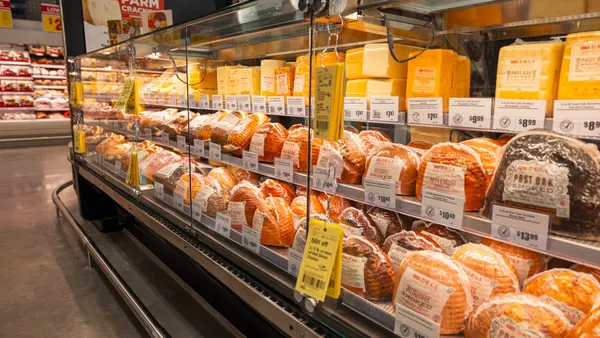Dive Brief:
- FMI – The Food Industry Association is pushing for changes to the Food Traceability Rule, which it called “one of the most burdensome regulations the industry is facing,” in a letter on Monday to the Department of Health and Human Services and the Food and Drug Administration.
- The trade association said the rule would impose high costs on the industry, “misplaces” its focus on reactive instead of preventive measures and includes measures that outstrip the FDA’s authority.
- FMI also suggested that the FDA withdraw the proposed rule on front-of-package nutrition labeling due to the “burdensome and costly” implementation it would impose on businesses and the agency's lack of authority to mandate.
Dive Insight:
FMI’s comments are in response to the HHS calling for suggestions to support “the largest deregulatory effort in the history of the Department.” As part of this solicitation, HHS welcomed input “explaining how regulations, guidance, paperwork requirements, and other regulatory obligations can be repealed.”
Proposed during President Donald Trump’s first term in response to a widespread E. Coli outbreak in romaine lettuce, the Food Traceability Rule requires companies and grocery stores to trace the foods in their supply chains for faster identification and quick removal of potentially contaminated food.
In March, the FDA said it plans to extend the rule’s compliance deadline, which was initially set for Jan. 20, 2026, by 30 months to allow additional time for businesses to comply with the rule’s requirements. While FMI, which has long raised concerns about the complexity of the Food Traceability Rule, said it appreciates the deadline extension, its letter says that the rule needs additional modifications to better facilitate compliance without compromising food safety.
“According to FDA’s own estimates, the rule is projected to require more than 3 billion records to be kept and maintained per year, resulting in over 10 million labor hours … Overall, FDA estimates that the rule will cost the food industry over $24.6 billion, an astronomical number,” FMI wrote in the letter.
The trade group’s trio of suggested changes includes providing flexibility for traceability of lot codes — the unique descriptor to identify a specific batch of food within a supply chain — at the distribution level. FMI also wants intracompany shipments to be exempt from the rule and for the rule to allow companies to identify the person responsible for assigning the lot code rather than the location where it was assigned.
“Providing flexibilities on lot code tracing and exempting intracompany shipments will make the rule more workable for industry while still ensuring FDA is able to receive and utilize the data it is requesting to improve food safety,” FMI Chief Public Policy Officer Jennifer Hatcher said in a statement.
FMI is also urging the withdrawal of the proposed rule that would require most packaged foods to display a “Nutrition Info” box on the top third of the front of the package with high, medium and low markers for the percent daily value for sodium, saturated fat and added sugars. If approved, the rule would result in “a fundamental redesign of most packaged food labels,” FMI said, adding that there is a lack of evidence suggesting that consumers would change their diets in response to the Nutrition Info box.
FMI also strongly encouraged the FDA to revoke two “outdated” requirements: the electronic recordkeeping requirements in 21 CFR Part 11 as well as a regulation requiring a warning statement for high-protein products.
The trade group asked the FDA to prioritize finalizing its proposed rule for the use of salt substitutes in standardized foods, which FMI said “would facilitate a small step toward modernization of standardized foods.”
“Deregulation can help to reduce regulatory inefficiencies that hinder that mission, and ultimately, drive up costs for consumers. We believe that adopting some reasonable revisions to the issues below will improve food safety without unnecessarily increasing food costs for consumers,” Hatcher said.














